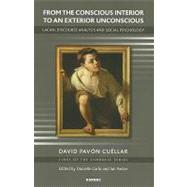From the Conscious Interior to an Exterior Unconscious
, by Cuellar, David Pavon; Carlo, Danielle; Parker, Ian- ISBN: 9781855757943 | 185575794X
- Cover: Paperback
- Copyright: 3/30/2010
This confrontational contribution to discourse analysis is also a critique of contemporary psychological abstractions, as well as a reassessment of the radical opposition between psychology and psychoanalysis, an original introduction to the perspective of the French psychoanalyst Jacques Lacan, and an attempt to bridge the gap between discourse-analytical debates in social psychology and the social-theoretical extensions of discourse theory. Exploring the oral teachings and written works of Lacan, David Pavón Cuéllar gathers a number of relevant key concepts with the aim of applying them to social theory and particularly to discourse analysis in social psychology. With this in view, the author provides a precise definition and a detailed explanation of each of the Lacanian concepts. He also gives an appreciation of their theoretical pertinence and practical usefulness, as well as an illustration of their use to analyze a concrete discourse, in this case a fragment of an interview obtained by the author from the Mexican underground Popular Revolutionary Forces (EPR). Throughout the book, Lacanian concepts are compared to their counterparts in psychology. Meaningless signifiers are compared to meaningful information, literal discourses to mental cognitions, unconscious representatives to conscious representations, and so on. Such a comparison reveals insuperable incompatibilities between the two series of concepts. The author shows that Lacan's psychoanalytical terminology can neither be translated nor assimilated to the terms of current psychology. In current psychology, there is no room for Lacan. So, before applying the Lacanian concepts, it is necessary to make room for them. This is a major purpose of the book. For this purpose, the way for the Lacanian concepts is cleared from behavioral, cognitive and discursive psychological ideas. The way is also cleared from other extra-psychological rival notions, which are fighting or could fight for the ground of discourse analysis in social psychology. Among the notions in actual or potential competition with Lacanian concepts, the book deals with those proposed by semiology, Marxism, phenomenology, constructionism, deconstruction, and hermeneutics. Taking a stand on those theoretical positions, each chapter includes long discussions about influential ideas of classical authors (specifically Barthes, Bakhtin, Althusser, Politzer, Wittgenstein, Berger and Luckmann, Derrida, and Ricoeur). In these discussions, there is a permanent recourse, in the body of the text, to the arguments of Lacan and Lacanians (such as Miller, Milner, Soler, and Žižek). At the same time, in the footnotes, there is a systematic reappraisal and reinterpretation of debates and pieces of research work in social psychology, especially in a discursive and critical domain that has incorporated elements of psychoanalytic theory (e.g. Billig, Parker, Frosh, and Hook, among others).






